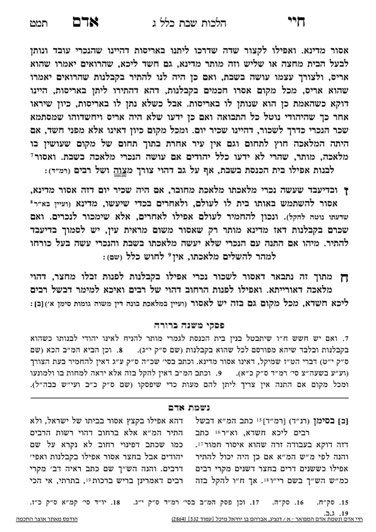We are beginning siman 7, where the Chayei Adam will discuss what happens, bedieved, when a non-Jew does work on something mechubar on Shabbos.
The Chayei Adam writes that if the arrangement with the non-Jew was of a sechir yom, if he did construction, the Jew may not benefit from the construction forever (agriculture may be different, as we learned in S0078-79). Others may benefit from the work after enough time has elapsed that the work could have been performed during the week. For example, if the non-Jew worked five 8 hour shifts over five Shabbosim, one would have to wait five days until benefitting from the construction.
The Chayei Adam writes that truthfully, it is preferable that no Jew derive benefit from the work, and the property should be sold to a non-Jew. The Jew may benefit from the money.
If the non-Jew was hired with an arrangement of a kablan, the work is inherently muttar, and the only issur is maris ayin. Therefore, bedeived, one may derive benefit from the work.
If the Jew made a condition with a non-Jewish kablan that he not work on Shabbos, but the non-Jew ignored the condition and worked on Shabbos, the Jew does not have to be concerned. The simple reading of the Chayei Adam is that the Jew does not have to be concerned in the sense that he does not need to try to intervene to stop the non-Jew. Since the arrangement is kablanus, which is inherently muttar, and the only concern is maris ayin, the Jew does not need to intervene once he took steps at the beginning of their arrangement.
However, the Piskei Mishnah Berurah brings that the Mishnah Berurah holds a Jew should still intervene to try to stop the non-Jew from working on Shabbos, even though the non-Jew is a kablan. Nevertheless, the Jew is not obligated to pay the non-Jew to stop.
In a scenario where the Jew did not stipulate at the beginning of the arrangement that the non-Jew cannot work on Shabbos, the Jew should offer money to convince the non-Jew to stop.
Summary
If one instructs a non-Jew before Shabbos, there are times when it will be muttar, depending on eight conditions.
The fifth condition is that the item not be attached to the ground, due to a concern of maris ayin.
However, if the maris ayin is not relevant, such as in a place where Jews have no access on Shabbos, it is not a problem. On the other hand, one must be concerned for the possibility of non-frum Jews driving past.
An arrangement of arisus is always muttar.
Work being done for a mitzvah, such as building a shul, may be muttar if the mitzvah will not otherwise be completed.
One should discuss such questions with their rav.
Bedieved, if the non-Jew worked on something mechubar over Shabbos:
If a sechir yom: it is assur bedieved and should be sold to a non-Jew. Others may benefit after enough time has elapsed for the work to have taken place during the week, but preferably should not receive any benefit from it.
One may benefit from the proceeds of selling it.
If a kablan, it is muttar bedieved.
If the Jew made a condition in the kablan’s contract that he refrain from work on Shabbos, the Jew does not have to intervene should the non-Jew work on Shabbos.
If the Jew did not make a condition, he must try to intervene, and even offer the non-Jew money to stop working.



